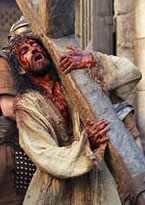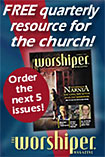| |
A Resource by Mark D. Roberts |
|
Recovering the Scandal of the Cross
by Rev. Dr. Mark D. Roberts February 2004
Copyright © 2004 by Mark D. Roberts
Note: You may download this resource at no cost, for personal use or for use in a Christian ministry, as long as you are not publishing it for sale. All I ask is that you give credit where credit is due. For all other uses, please contact me at mark@markdroberts.com. Thank you.
My Various Writings on Jesus
The Birth of Jesus: Hype or History?
Was Jesus Divine? The Early Christian Understanding
Why Did Jesus Have to Die?
Was Jesus Married? A Careful Look at the Real Evidence
What Was the Message of Jesus?
How Can We Know Anything about the Real Jesus?
What Languages Did Jesus Speak and Why Does It Matter?
Recovering the Scandal of the Cross?
The Passion of the Christ: An In-Depth Review
Book -- Jesus Revealed: Know Him Better to Love Him Better
Part 1
"For Jews demand signs and Greeks desire wisdom, but we proclaim Christ crucified, a stumbling block [skandalon] to Jews and foolishness to Gentiles, but to those who are called, both Jews and Greeks, Christ the power of God and the wisdom of God." (1 Corinthians 1:22-24)
Perhaps more than anything in our lifetime, The Passion of the Christ has helped us experience the scandal of the cross.
Before I explain what I mean, I want to add a qualifier. It is possible to be a faithful Christian and not like Mel Gibson's movie. Although the majority of Christians have been deeply moved by the film, a few have criticized it, either as being too gory or too Catholic or even as a violation of the Second Commandment (forbidding "graven images"). So I want to be clear that one can be scandalized by The Passion of the Christ while still embracing the true passion of Jesus Christ.
Nevertheless, Mel Gibson has helped us experience the true scandal of the cross. First of all, he has reminded us of how terrible crucifixion and the tortures that often accompanied it really were. The Romans had lots of "nice" ways of executing criminals. Crucifixion was reserved for the lowest of the low, when Rome needed an over-the-top deterrent. In fact crucifixion was so repugnant that civilized Romans rarely even spoke of it. (See the classic treatment by Martin Hengel, Crucifixion.) We Christians, on the contrary, have become so used to speaking about crucifixion that we tend to miss its horror. One cannot view The Passion of the Christ without experiencing, perhaps for the first time, the physical scandal of the cross. Jesus didn't die on some artistic religious symbol, but on one of the cruelest implements of torture and murder ever invented by depraved humanity. We can now understand why the message of the cross sounded so foolish to first-century Jewish and Greek listeners. They weren't crazy to think that a real God would have nothing to do with crucifixion, let alone suffer it.
The good news of the crucified Savior is still regarded as folly by many in today's world. As I have listened carefully to critics of The Passion of the Christ , some have limited their criticism to the movie alone. But others have gone on to disparage the core Christian belief that Christ, through his death on the cross, was bringing salvation to the world. Their view, simply put, is this: "I'm offended by the idea that God would demand the death of anyone to atone for sin. My God wouldn't do this. My God is a God of love, not torture." Those who articulate such a view aren't crazy, through I think they're wrong. Indeed, they are responding as people have done for centuries to the folly of the cross. They are scandalized, not merely by Mel Gibson's movie, but by Christian story of salvation - salvation that required death to atone for sin.
We who live in a Christian ghetto can too easily forget the folly of the cross. We can also trivialize the perplexing paradox that God became human in Jesus, "and being found in human form, he humbled himself and became obedient to the point of death - even death on a cross" (Philippians 2:7-8). "Even death on a cross!" This is indeed a stumbling block, in Greek, a skandalon. Jesus didn't only subject himself to death, but to one of the worst kinds of death imaginable. If you've seen The Passion of the Christ, this requires no further explanation.
Why do we Christians need to recover a sense of the scandal of the cross? For one thing, it helps us realize the depths to which God is willing to stoop in order to save us. This leads us to wonder, gratitude, and humble worship (Philippians 2:7-11). Moreover, it is only when we grasp the true meaning of the cross - including its scandal - that we'll be ready to communicate the full gospel of God to people who do not yet believe.
As Christians, we are called to proclaim the paradoxical good news of the cross to our neighbors, many of whom will find it both foolish and offensive. Our task is not to lessen the offense by watering down the message, but to find ways of communicating the message so that people will understand its truth. Moreover, we are to incarnate that message through our life of sacrificial love and service. Finally, when we realize the immense challenge of preaching a "foolish" gospel, then and only then will we rely fully on the Spirit of God, who alone opens hearts to receive the scandalous, paradoxical, prodigal love of God in Christ.
Part 2
"Why do you embrace your cross, you fool?" - from The Passion of the Christ , spoken by one of the criminals to be crucified with Jesus
This is one of the most profound, moving lines in The Passion of the Christ. It's also one of the lines in the movie that doesn't come directly from the biblical gospels. Though both Matthew and Mark testify that those crucified with Jesus taunted him, we're not supplied with their exact words. Luke only gives the words when one of the criminals called out to Jesus to remember him. Mel Gibson and his co-writer, Benedict Fitzgerald filled in the biblical blanks here - brilliantly, I believe.
Why is this line so brilliant and, in the end, so stirring? Well, for one thing it is cleverly ironic. In the context of The Passion of the Christ it is spoken by a criminal who sees Jesus clinging to his cross because he can barely stand, having been ruthlessly beaten to within an inch of death. Yet the criminal speaks a truth far beyond his own wisdom. Jesus is clinging to his cross, not only literally, but also in the sense that he has chosen the way of the cross, the way of self-giving love. He isn't a victim of Jewish plotting or Roman cruelty so much as the willful actor in the divine drama. This point is made later on in the movie when, arriving at Golgotha, Jesus looks directly at the Jewish leaders and says "No one takes my life from me, but I lay it down of my own accord." (Although this line does not appear in the gospel accounts of the crucifixion, it comes from the mouth of Jesus in John 10:18. By including this line directed to the Jewish leaders, by the way, Mel Gibson makes it clear that the they are not ultimately responsible for the death of Jesus. This is a pro-Semitic tweaking of the biblical story, if you will.)
 |
Why is this line so brilliant and, in the end, so stirring? Well, for one thing it is cleverly ironic. In the context of The Passion of the Christ it is spoken by a criminal who sees Jesus clinging to his cross because he can barely stand, having been ruthlessly beaten to within an inch of death. Yet the criminal speaks a truth far beyond his own wisdom. Jesus is clinging to his cross, not only literally, but also in the sense that he has chosen the way of the cross, the way of self-giving love. He isn't a victim of Jewish plotting or Roman cruelty so much as the willful actor in the divine drama. This point is made later on in the movie when, arriving at Golgotha, Jesus looks directly at the Jewish leaders and says "No one takes my life from me, but I lay it down of my own accord." (Although this line does not appear in the gospel accounts of the crucifixion, it comes from the mouth of Jesus in John 10:18. By including this line directed to the Jewish leaders, by the way, Mel Gibson makes it clear that the they are not ultimately responsible for the death of Jesus. This is a pro-Semitic tweaking of the biblical story, if you will.) |
| © 2004 ICON Distribution, Inc. |
The criminal condemns Jesus as a "fool" for embracing his cross. In this way The Passion of the Christ summarizes the world's perspective on authentic Christianity. As the Apostle Paul wrote to the Corinthians about the good news of the cross, it is "a stumbling block to Jews and foolishness to Gentiles" (1 Corinthians 1:23). Who would embrace the cross as the way of saving the world from sin? Only Christ the fool, the world says. And who would believe that the crucifixion of Jesus would bring salvation to the world? Only foolish Christians, the world says.
And so we know who we are in the eyes of the world - or who we should be if we uphold the core of Christian faith. Fools! Fools who believe in the paradoxical good news of Christ crucified. Fools who believe that we can't earn our own salvation through good works or good intentions. Fools who, like Jesus, embrace the cross as the way of eternal life. In the classic lines of Augustus Toplady's hymn:
Not the labors of my hands
Can fulfill Thy law's demands;
Could my zeal no respite know,
Could my tears forever flow,
All for sin could not atone;
Thou must save, and Thou alone.
Nothing in my hand I bring,
Simply to Thy cross I cling;
Naked, come to Thee for dress;
Helpless, look to Thee for grace;
Foul, I to the fountain fly,
Wash me, Savior, or I die!
The scandal of the cross appears, not just in classic hymns, but also in some of the finest of recent songs. Consider, for example, the words of Michael Card's stirring song, "Scandalon." It perfectly illustrates the point I have been making in this article.
The seers and the prophets had foretold it long ago
That the long awaited one would make men stumble
But they were looking for a king to conquer and to kill
Who'd have ever thought He'd be so weak and humble
Chorus
He will be the truth that will offend them one and all
A stone that makes men stumble
And a rock that makes them fall
Many will be broken so that He can make them whole
And many will be crushed and lose their own soul
Along the path of life there lies a stubborn Scandalon
And all who come this way must be offended
To some He is a barrier, To others He's the way
For all should know the scandal of believing (Chorus)
It seems today the Scandalon offends no one at all
The image we present can be stepped over
Could it be that we are like the others long ago
Will we ever learn that all who come must stumble (Chorus)
There is also a marvelous new worship song that puts biblical theology of the cross into beautiful, poetic, and truth-saturated song. I highly recommend this song, which you can access through the website of its gifted author, Phil Mehrens. The song is called "Sovereign Lord." I'd urge you to listen to the sample on Phil's website and then buy the song for use in worship. The music is stirring. Here are its inspired lyrics:
Righteous Life, flesh so torn
Wounded hand, brow with thorn
Broken heart enduring scorn
Is this the Sovereign Lord?
Borrowed tomb, empty space
Takes our sin, leaves His grace
Destined for the highest place
This is the Sovereign Lord!
Chorus
Lord, Your greatness is unsearchable
And Your Kingdom lives forever
You are near and You are wonderful
You are My Sovereign Lord
Fallen heart, lifted eyes
Stumbling words, longing sighs
Trembling hands embrace the skies
You are my Sovereign Lord
Risen heart, joyful eyes
Praises soar, my soul flies
Song of life that never dies
You are my Sovereign Lord! (chorus)
 |
If you are looking for scholarship on Jesus that is careful and yet readable, you might find my book Jesus Revealed to be helpful. Each chapter summarizes historical evidence that helps us to understand Jesus, yet in a way that is meant for non-specialists. Plus, each chapter also connects the historical discussion to our personal faith today.
For more information on this book, click here. |
Home
|






